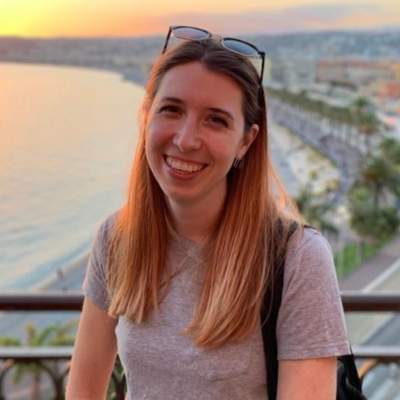1. What does a typical day at your job look like?
I am on a small team focused on the prevention of identity-based mass violence, so I am usually working on various projects at once.
Some days, I coordinate with partner organizations to plan events or edit commissioned papers. Other days are filled with convening virtual or in-person discussions with civil society leaders, academics, and policymakers from around the world.
I appreciate that my job allows me to speak with many different organizations and experts working on policy change at the subnational, national, and international levels.
2. What’s the most exciting part about your work?
My team has a thematic rather than regional focus, so I’m able to work on mass violence prevention in a variety of countries and contexts.
I have opportunities to speak with civil society organizations in Latin America and the Caribbean about challenges in the region, work with experts on the risk of violence in the U.S., and coordinate with the Peace in Our Cities network to reduce urban violence.
Working on such a wide range of issues helps me build my network as an early career professional, and it also provides incredible professional travel opportunities.
3. How did you find your job/what’s the best resource for jobs or networking you’ve found?
I found every job I applied for online. When I was searching, I made a list of the organizations I was most interested in working for and bookmarked their career pages to keep up with updates that were not shared on other sites.
I also identified the areas I was most passionate about (human rights, atrocity prevention, gender analysis, etc.) and set job alerts for those keywords on major job sites such as Idealist. I did not know about the Stanley Center before I received an alert for my current position, so apply to anything that piques your interest!
The Stanley Center is also a member of the OrgsinSolidarity partnership, which hosts a job board as part of its efforts to diversify the peace and security field and make opportunities more accessible to underrepresented groups.
4. How did studying at the School of Modern Languages impact your career?
The International Affairs and Modern Languages program allowed me to pursue two majors when I had no idea where to focus my studies. I studied abroad through the Nontraditional Security Challenges in Southeast Asia program and the Language for Business and Technology program in Ecuador.
Each experience introduced me to new regions, languages, and policy challenges that motivated me to pursue my graduate studies in international human rights law.
5. What skills did you learn during your studies that contribute to your daily life?
My Spanish skills might not be as strong as they were when I was studying in Ecuador, but I still use them today!
The Stanley Center co-organizes the Latin American and Caribbean Civil Society Forum for the Prevention of Mass Atrocities, so I put my Spanish skills to the test when we organize meetings and publish documents for the forum in English, Spanish, and Portuguese.
In general, my courses at Georgia Tech encouraged me to question my assumptions, take in new perspectives, and find opportunities to make a difference.
6. What advice would you give to current Modern Languages students and fellow alumni?
I would encourage others to pursue opportunities to work on projects outside of their immediate line of work. Some of my greatest leadership and learning opportunities have come from participating in the OrgsinSolidarity partnership and working on our internal culture committees.
Jessica Kline graduated with a Bachelor of Science in International Affairs and Modern Languages in 2016. Explore more IAC alumni careers here!

